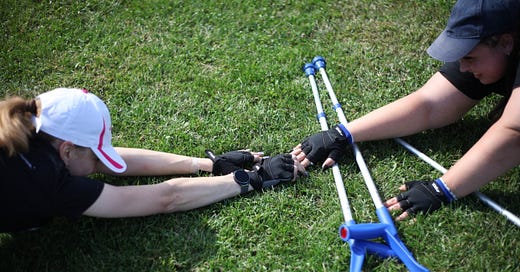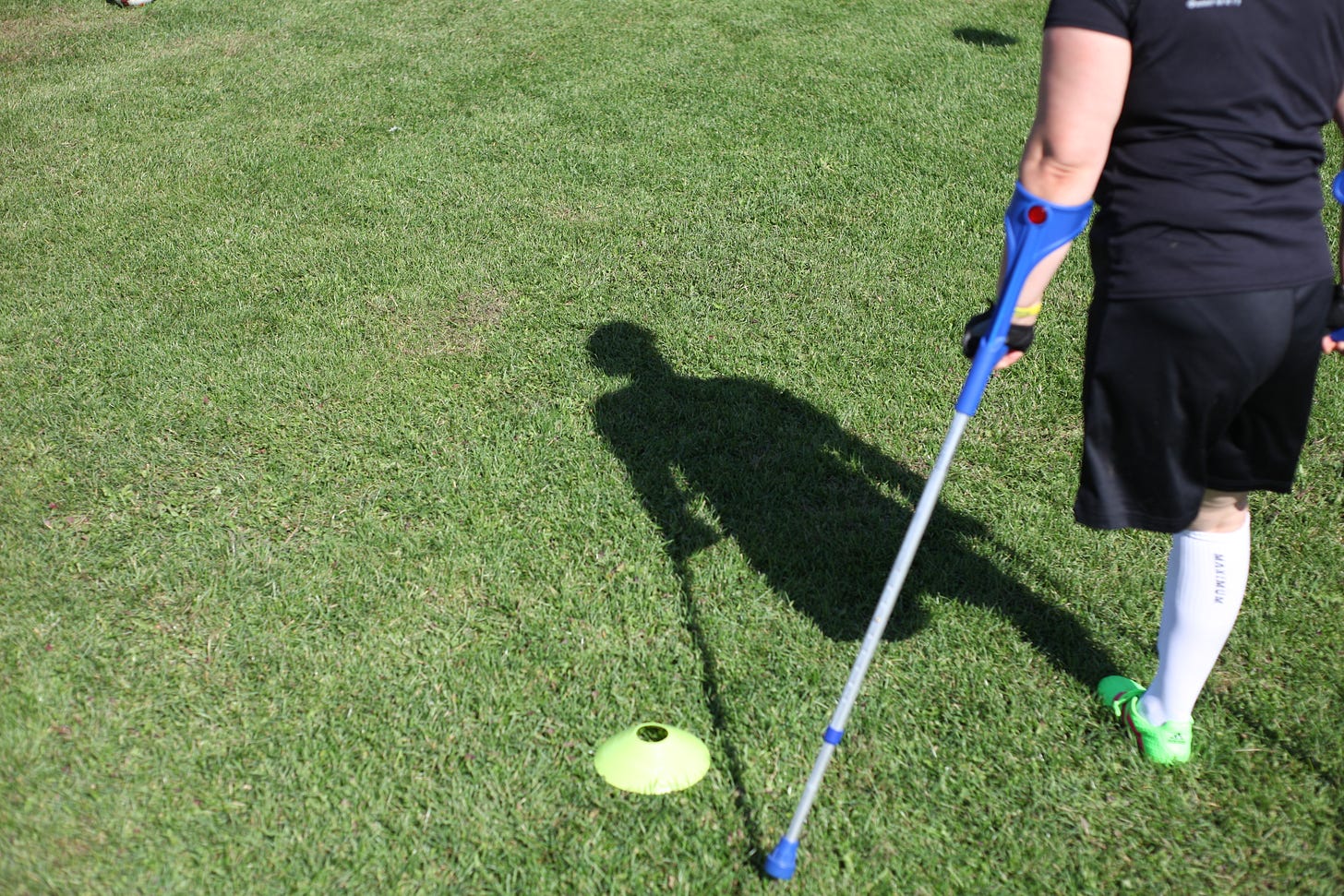Finding strength after loss - Ukraine's first female national amputee soccer team prepares for World Cup
With the arrival of players, life around the pitch is livening up. While they get changed, the physiotherapist prepares the warm-up equipment, the coach and assistant coach have a final talk about the training session. Nearby, the team’s social media manager captures reels and photos, giving fans a close-up view of their preparations.
After combing their hair, the player’s of Ukraine’s first female soccer team of amputees detach their prosthetic legs and make small adjustments to their clutches before stepping onto the field for training.
The team is scheduled to travel to Colombia early November to participate in the World Championship for the first time in its history.
Among them is Olya, the 34-year-old team captain, war veteran and mother of two, who found refuge in sport not just after losing a leg but when her husband went missing in the frontlines while trying to stop Russia’s invasion.
Olya joined the Ukrainian Army in 2016 and served as a cook until 2017, when during the fierce battle for the southeastern Ukrainian town of Avdiivka a Russian artillery shell injured her so gravely that her left leg had to be amputated.
She says it was sport that helped her to get through the trauma of losing a limb and begin a new life with prosthetics. She did CrossFit and shortly after her operation she ran at a race for Veterans in Washington D.C.
“Looking back, it did not only help me to recover physically, but gave me a community I could belong as well.”
When her husband, who had joined the Ukrainian Army shortly after Russia’s full-scale invasion in 2022, disappeared without a trace at the frontline in early 2023, she was devastated. However, after a brief period, she knew exactly what to do.
“I logged out of life, so to say. I was injured, but this time it was not physical, but psychological, emotional. I didn't want to communicate with anyone, I didn't go anywhere, I locked myself in the flat with the children,” she said.
She never ever thought of playing soccer, but that changed when a friend suggested she give it a try. “I realized, that I have to go through a kind of rehabilitation again,” she said.
With her husband presumed to be dead by his comrades, for Olya, trying soccer was about much more than just a game. It was a way to get through another dark period of her life.
“During my first soccer training camp, I communicated as little as possible with people. It was shortly after the disappearance of my husband,” she recalls.
Eventually, going back and forth between the training camp and her Kyiv apartment, Olya also loosened up. “We became very good friends with the girls, I think because we understand and support each other since we face similar hardships in life.”
Amputee football follows similar rules to the traditional game, with a few key differences. The pitch is smaller, goalkeepers can only have one hand, and players are not allowed to touch the ball with their crutches or residual limbs. Instead of throw-ins, the ball is kicked from the sidelines. Prosthetic limbs are removed to ensure a level playing field for all competitors. Teams consist of six outfield players and a goalkeeper.
“At first I felt strange because I had to run using crutches. It’s like walking on my hands instead of feet. I had to strengthen them a lot,” Olya said.
Today’s session is the team’s last before a friendly match against the men’s amputee team from Cherkasy.
“We know the situation in the country and the world cup is not only important for us but for the whole country, all eyes will be on us,” the team’s coach said after briefing the players on the day’s exercises. “Let’s show our spirit, that we are unbreakable, that we are strong, and invincible.”
After doing gymnastics and warming up, they move to ball work, focusing on short passes and quick directional changes.
As the team practices offensive drills, one player takes a tumble, pain etched across her face. The session pauses as her teammates gather around. A few tense moments later, after a careful check by the team’s doctor, the player is cleared to continue, and training resumes.
In amputee soccer, an additional consideration the coaching staff has to keep in mind when deciding on the roaster before heading to Columbia is the player's schedule for medical checks and surgeries, as well as their family commitments.
Olya, whose favorite part in the game is goal-scoring, is relieved to practice with women with similar conditions, given that most war veterans with prosthetics were males. When asked about the difficulties she faces when she’s off the pitch, she says the view on people with prosthetics has rapidly changed as a result of Russia’s war and the mounting casualties.
“Before the war, people gasped, turned around me in the street, saying look, she has prosthetics,” she recalls. “Disabled people tried to hide their prosthetics, often avoiding going out from their house even. This changed. It is important to show that I am okay with it, I accepted myself, and I’m willing to show who I really am,” she said.
As the captain of the team about to make history with their World Cup debut in November, Olya feels the stakes. “I’m very excited but worried about it at the same time. But I know it won’t be too bad if we pay attention, and train hard.”
“It’s anyone’s cup, really,” said McKinsey, their coach from the U.S., when asked about their chances in the upcoming cup. One of their strongest competitors, Poland, trains daily, while Ukraine’s team can only gather for week-long training camps sporadically. Outside these camps, the women train with men’s amputee teams in their local cities.
The team finishes with some friendly competition: two players have to race for the ball, and the first one to reach it will play offensive, while their peer takes the role of defense.
Goals are scored and spectacular saves close the training, after which the girls relax with some stretching before heading to lunch and further on with their preparation ahead of Friday’s friendly game.
“But there’s much more than just training that goes into it - it’s passion. They are fighting for their country out here. You don’t start saying I’m too tired when you’re a soldier out on the pitch, fighting for your country,” their coach adds.
McKinsey, who is a prosthetic in the U.S., took up the role of coach in September 2023, combining her profession with her love of football. She travels regularly to Ukraine to lead training sessions. “Every time I come, it’s harder to leave,” she admits.







